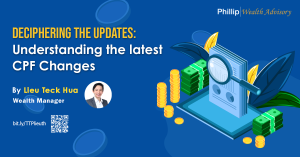4 Things My Dad Taught Us About Personal Finance June 17, 2021

Fathers often play a different role from mothers in parenting and raising their children.
In Asia, fathers are traditionally the heads and main breadwinners of the family.
Mothers are tasked with domestic matters, though these days, many are successful career women in their own right, excelling both in and out of home.
Every father figure is different. Mine is a man of few words but firm. While the children’s education was the purview of my mother, my father would step in to discipline any of us when necessary.
My father also imparted to us from young some important financial concepts and precepts. These have served my siblings and I well, as we become parents ourselves. They continue to influence our financial decision-making till this day.
Lesson 1: Choose practicality over gratification
One of the lessons my father taught us – that is forever etched in my mind – was what to consider when buying a car.
Though brand-new cars are ideal, buying one might not be the best financial decision.
New cars would require larger upfront payment as well as taking up a larger loan quantum, which may rank as one of your bigger monthly liabilities after a mortgage for a property.
Second-hand cars might not be spanking new but can achieve the same goal of bringing you from Point A to Point B. They are generally more affordable and economical for those whose jobs require a car to zip around town, such as sales professionals, housing agents or insurance agents. They are just as good at ferrying elderly parents and young kids around.
A word of caution, though. Buying a second-hand car does require some knowledge of the condition of the used car. Not all of us can spot faulty parts or prior damage in a car. As such, it is best to call on the services of a reputable car dealer when selecting your car.
The same practicality in buying a car can be extended to other financial decisions. Basically, what Dad was teaching us was, what is desirable may not be the most economical or sensible. One should always hold back one’s instinct for brand-new things and decide on the basis of practicality.
Beyond cars, the advice can be applied to decisions such as buying a condominium, where to go for a honeymoon – Europe or more cost-effective Malaysia – and even a simple meal at a hawker centre versus a fine-dining experience in a 2-star Michelin restaurant.
Lesson 2: Spend on the things that are worth it
We also learnt from our father how one should spend money, simply by observing his habits. While my father is frugal – he gave his entire salary to my mother for housekeeping purposes and moonlighted to earn his keep, he did not pinch pennies when he saw the need to spend.
For instance, being a great believer of family bonding, he would not hesitate to bring us out for a meal to spend time together once in a while. Every public holiday would be spent visiting places like the Singapore Zoo or Jurong Bird Park. It would end with a simple but thoroughly enjoyable, satisfying meal at a good hawker centre or a modest air-conditioned restaurant if the weather was hot.
Lesson 3: Never stop learning
While working in a sales team for an engineering parts company, he also worked part-time on weekends, as a taxi driver, he upskilled himself by learning computer skills and designing presentation slides to explain the technical jargon used at work to present to clients and colleagues. These efforts caught the attention of his management in the full-time job, who chose him to visit its various satellite offices to share his knowledge with the other colleagues.
My father eventually gave up his part-time job due to age and health concerns but not before he had actualised himself with the additional knowledge and skills and earned the recognition of his company.
Lesson 4: Grow your income to attain financial freedom
Though he might not have been a great investor, my father showed us that working hard to increase income is important, in our journey towards financial freedom. While investing can speed up the growth of funds, increasing our base income and setting aside funds for the future are equally critical.
After all, one can still achieve one’s financial targets by setting aside S$1,000 every month in a savings account. This can be done more easily than investing S$100 a month at a rate of return of 10%. Building a pool of emergency funds earlier would also allow one to invest with greater peace of mind, knowing you would not be forced to liquidate your investments in a short time in a contingency.
What my father did not teach us but I will also teach my kids: Start investing early
My father did not share his investment knowledge with us because he had only tried investing once, through his Central Provident Fund account. That experience left him unfazed, as it did not yield good results.
In my parents’ time, investing was rocket science. Many might not have heard of investing, let alone dabbled in it. Investment was also generally perceived to require large sums of money and risky.
I believe that teaching my kids the importance and fundamentals of investing early is crucial, as it is part of holistic personal financial planning. While cultivating a habit of saving is important, it is equally essential to look beyond parking funds in piggy banks or bank accounts to grow wealth.
I will introduce to them the concept of investing by showing them how to cultivate a plant. Watering plants daily is akin to the idea of setting aside savings consistently. Otherwise, the plant would not grow healthily. The children would then be taught how to choose different types of seeds, which would yield different plants. These would provide an analogy to the various investment options in the world of investing.
Together with the four lessons from my dad, I hope that my children would grow up to have good financial habits and the ability to manage their finances wisely.
To my Dad, I thank you for the headstart you gave me and all the contributions and sacrifices you made for the family!
Wishing all the fathers out there a blessed Father’s Day!
Disclaimer
These commentaries are intended for general circulation. It does not have regard to the specific investment objectives, financial situation and particular needs of any person who may receive this document. Accordingly, no warranty whatsoever is given and no liability whatsoever is accepted for any loss arising whether directly or indirectly as a result of any person acting based on this information. Opinions expressed in these commentaries are subject to change without notice. Investments are subject to investment risks including the possible loss of the principal amount invested. The value of the units and the income from them may fall as well as rise. Past performance figures as well as any projection or forecast used in these commentaries are not necessarily indicative of future or likely performance. Phillip Securities Pte Ltd (PSPL), its directors, connected persons or employees may from time to time have an interest in the financial instruments mentioned in these commentaries. Investors may wish to seek advice from a financial adviser before investing. In the event that investors choose not to seek advice from a financial adviser, they should consider whether the investment is suitable for them.
The information contained in these commentaries has been obtained from public sources which PSPL has no reason to believe are unreliable and any analysis, forecasts, projections, expectations and opinions (collectively the “Research”) contained in these commentaries are based on such information and are expressions of belief only. PSPL has not verified this information and no representation or warranty, express or implied, is made that such information or Research is accurate, complete or verified or should be relied upon as such. Any such information or Research contained in these commentaries are subject to change, and PSPL shall not have any responsibility to maintain the information or Research made available or to supply any corrections, updates or releases in connection therewith. In no event will PSPL be liable for any special, indirect, incidental or consequential damages which may be incurred from the use of the information or Research made available, even if it has been advised of the possibility of such damages. The companies and their employees mentioned in these commentaries cannot be held liable for any errors, inaccuracies and/or omissions howsoever caused. Any opinion or advice herein is made on a general basis and is subject to change without notice. The information provided in these commentaries may contain optimistic statements regarding future events or future financial performance of countries, markets or companies. You must make your own financial assessment of the relevance, accuracy and adequacy of the information provided in these commentaries.
Views and any strategies described in these commentaries may not be suitable for all investors. Opinions expressed herein may differ from the opinions expressed by other units of PSPL or its connected persons and associates. Any reference to or discussion of investment products or commodities in these commentaries is purely for illustrative purposes only and must not be construed as a recommendation, an offer or solicitation for the subscription, purchase or sale of the investment products or commodities mentioned.
About the author
Teo Huan Zi
Branch Manager, Phillip Investor Centres
Teo Huan Zi graduated from Nanyang Technological University (NTU) in 2014 with a bachelor’s degree in Business, majoring in Banking and Finance. Having been with Phillip Securities since 2015, he currently manages a portfolio of over 10,000 trading accounts as a Branch Manager. Prior to his current role, Huan Zi was also a senior equity specialist and senior investment specialist in the company. He also frequently conducts seminars and webinars to empower his clients with financial and investment knowledge such as fundamental analysis and technical analysis.
He regularly contributes and features in different media platforms such as 958 radio and provides market commentary for various newspaper like LianHeZaoBao (联合早报), The Edge, and Business Times.

 Japan’s Economic Resurgence: Unveiling the Tailwinds Behind Nikkei 225’s Record Leap
Japan’s Economic Resurgence: Unveiling the Tailwinds Behind Nikkei 225’s Record Leap  How to soar higher with Positive Carry!
How to soar higher with Positive Carry! ![[Smart Park] Buy Insurance, Get Rich Quick? Not Exactly, But This Comes Close [Smart Park] Buy Insurance, Get Rich Quick? Not Exactly, But This Comes Close](https://www.poems.com.sg/wp-content/uploads/2024/03/Valerie-Lim-LI-X-SMART-Park-Article-300x157.jpg) [Smart Park] Buy Insurance, Get Rich Quick? Not Exactly, But This Comes Close
[Smart Park] Buy Insurance, Get Rich Quick? Not Exactly, But This Comes Close  Deciphering the Updates: Understanding the latest CPF Changes
Deciphering the Updates: Understanding the latest CPF Changes 









